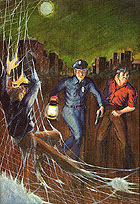The following posts include (1) "footnotes" for The Doris Piserchia Website (link at left), (2) texts-in-process that will eventually appear there, (3) texts from other websites, and (we hope) (4) stimulating discussion threads. The picture to the left is the back cover of The Spinner (book club edition), depicting a citizen of Eastland "hanging out" while Ekler the cop and Rune the idiot-superman look on.
View current page
...more recent posts
Doris Piserchia's rather amazing first book encapsulates everything right and wrong about her writing. There is the cranky, Old School prose that bodes no good, the sometimes stilted attempt at a breezy noir-ish style that doesn't always ring true. But Mister Justice rapidly becomes a living narrative that, in the end, is one of the most profound time travel stories of the last fifty years. A garden variety weird revenge story grapples with the inherent paradoxes that silly up most time travel stories, and creates a time travel without instrumentality tale every bit as interesting as the recently deceased Jerry Yulsman's Elleander Morning.
Mister Justice is a monster of a narrative, flying hither and yon through layers of themes before bringing it all Home. The corruption of modern consumer capitalism, the criminality lying beneath the surface of civil society, and the lack of justice in a hackneyed legal system form a dystopic P.O.V. that is only the setting for a complex tale of a temporal Vigilante trying to save the world. And the tale is the juice of a time travel vision of great subtlety and innovation. No clunky Time Machines, no shiny tech rationale, but an interior time voyage through the infinite worlds of a mysterious multiverse. Reviewing the plot cannot begin to do justice this interesting book, so we quote a passage that Speaks to us.
Time was a series of corridors with each moment having its own corridor.Or...
Time was the clocked motion of matter. As such, it became an abstract, not real and not there, merely a convenience created by minds.
Or...
Time was a portrait of whatever existed. Like an oil painting, time--reality, space, matter--lay sprawling everywhere, and each atom of pigment represented a minutia of thing, state, being. No change took place in the portrait for it was a still life, a great gob of paint hurled onto canvas. Change? Nonexistent, abstract. The atom that lay after the one before it had a different state of being. Reality was motionless. Everything on the painting was in a static condition. To comprehend change here, one had to have senses keen enough to perceive an atom and at the same time perceive the next atom and the next.
Perhaps time was more like a cartoon than a painting. The show was finished if the hand stopped drawing. Each slide died after its showing, or it was arrested and never moved again. A leg raised and stayed forever raised unless the next slide came to show it descending: a scattering of motion, blurred movement, nothing at all unless one happened to be the owner of the leg.
To travel in time, one had to walk across the portrait, tramp over the atoms representing yesterdays. Along the way, such a traveler would pass his selves or his replicas who had served to bring him to the present. The replicas were as real or as unreal as he. A sense of space wasn't needed if one wished to travel over the painting. What was necessary was the unusual ability to know where today was in relationship to yesterday. The normal person related tomorrow with today more easily than he did today with yesterday. What was gone must be let go of, while what was yet to come still had to be reckoned with. The time traveller first needed a piece of today in order to orient himself, then he fastened himself to the piece, and his mind moved, and now his body was in a different position in reality. The building of a hundred years ago still existed, the scream heard by someone a month before still rang, the past tide flowed without being perceived. What had gone into stillness was real to the time traveler because he knew where it was. Not when, but where.
--from Strange Words
